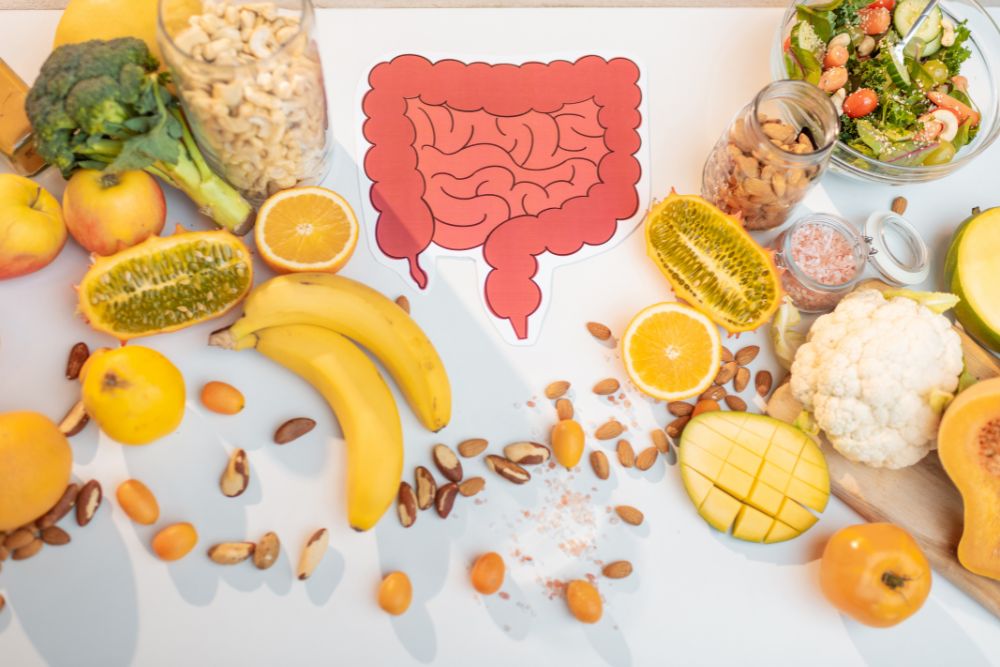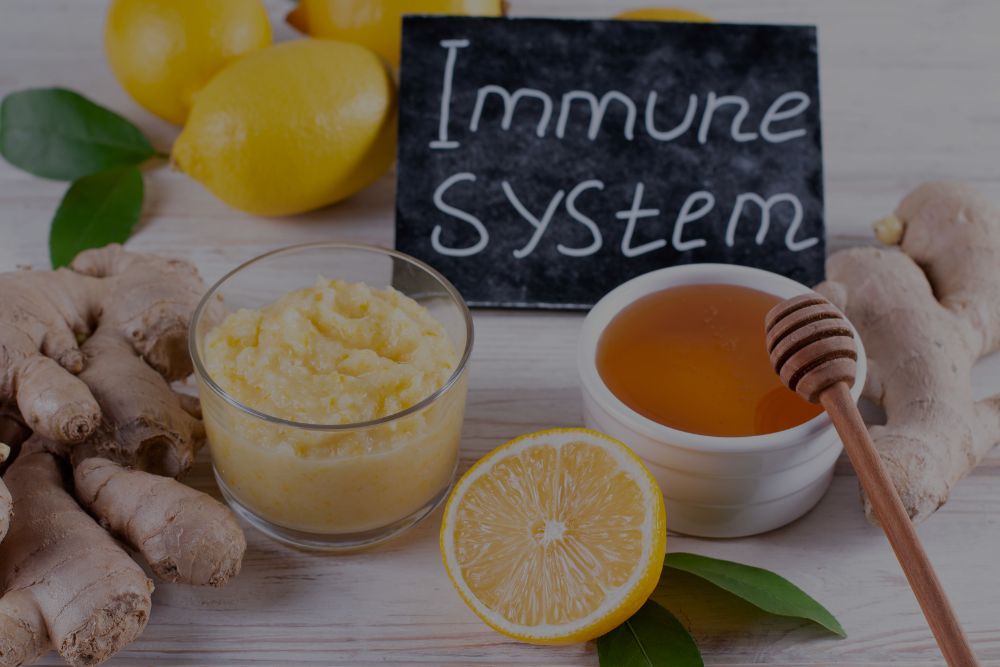
As someone with 30 years of experience in Nutrition, its exciting times that we are now understanding how gut health affects your immune system. This is a topic that’s gaining more attention in the health world, and for good reason.
Many people are curious about how what happens in our gut can influence our overall health, especially our ability to fight off illnesses. In this blog I will explore this connection and answer some common questions.
What is Gut Health?
Gut health refers to the balance of microorganisms living in your digestive tract. This includes bacteria, viruses, fungi, and other microbes. A healthy gut has a diverse range of these microorganisms, which play a crucial role in digestion, metabolism, and immune function.
When the balance is disrupted – often due to poor diet, stress, or illness – it can lead to various health issues.
The Gut-Immune System Connection
Important Fact: About 70% of your immune system is located in your gut. This means that the state of your gut directly influences how well your body can defend itself against infections and diseases.
Here’s how:
- Barrier Function: The gut acts as a barrier that prevents harmful substances from entering the bloodstream. A healthy gut lining helps keep out bugs and toxins.
- Microbiome Diversity: A diverse microbiome (a community of microorganisms that can usually be found living together) supports a strong immune response. Different types of beneficial bacteria help train your immune system to distinguish between harmful invaders and harmless substances.
- Production of Immune Cells: The gut microbiota produces various compounds that help stimulate the production of immune cells. These cells are essential for fighting infections.
- Inflammation Regulation: A balanced gut microbiome helps regulate inflammation in the body. Chronic inflammation can weaken the immune system and lead to various diseases.

Common Questions About Gut Health and Immunity
1. How can I improve my gut health?
Improving gut health involves several lifestyle changes:
- Eat a Varied Diet: Focus on whole foods rich in fibre, such as fruits, vegetables, whole grains, and legumes. These foods feed beneficial gut bacteria.
- Include Fermented Foods: Foods like yogurt, kefir, sauerkraut, and kimchi contain probiotics that promote a healthy microbiome.
- Stay Hydrated: Drinking plenty of water supports digestion and nutrient absorption.
- Limit Processed Foods: Reduce intake of sugar and artificial additives that can harm beneficial bacteria.
2. Are probiotics necessary?
Probiotics can be beneficial for some individuals, especially after taking antibiotics or during times of stress. However, probiotics can trigger symptoms for those with issues with histamines and so it’s best to consult with a Dietitian before starting any supplements.
3. Can stress affect my gut health?
Yes! Chronic stress can disrupt the balance of gut bacteria and lead to inflammation. It is always recommended to assess your current source of stress and reduce it where you can however many of us can not change this so practicing stress management techniques like mindfulness, yoga, or regular exercise can help maintain a healthy gut. Getting outside is super important to connect with nature.
4. How long does it take to improve gut health?
Improvements can often be seen within a few days, or weeks of making dietary and lifestyle changes we see this in hundreds of our patients. However, everyone’s body is different; some may take longer to notice significant changes.
5. What are the signs of an unhealthy gut?
Common signs include:
- Digestive issues like bloating, gas, or diarrhoea, constipation
- Food intolerances
- Unexplained weight changes
- Sleep disturbances or constant fatigue, anxiety
- Skin irritation
- Autoimmune conditions
6. Can gut health influence mental health?
Yes, there’s a strong connection between gut health and mental well-being. The gut-brain axis is a bidirectional communication system between the central nervous system and the enteric nervous system of the gut. A healthy gut can positively impact mood, stress levels, and even cognitive function.
Our programs and courses are renowned for improvements in this area.
Tips for Supporting Your Gut Health
- Eat More Fibre: Aim for at least 30 grams of fibre each day from various sources.
- Incorporate Probiotic Foods: Include fermented foods regularly in your diet for added benefits.
- Limit Antibiotic Use: Only use antibiotics when necessary as they can disrupt your microbiome.
- Get Enough Sleep: Quality sleep is essential for maintaining a healthy immune system.
- Exercise Regularly: Physical activity promotes healthy digestion and reduces stress levels.
- Manage Stress: Chronic stress can negatively impact gut health. Try stress-reduction techniques like meditation or deep breathing exercises.
- Stay Hydrated: Drinking enough water is crucial for maintaining a healthy gut lining.
- Avoid Excessive Alcohol: Too much alcohol can disrupt the balance of gut bacteria.
- Eat Mindfully: Take time to chew your food thoroughly and eat without distractions.
- Consider Prebiotic Foods: Certain foods like garlic, onions, and bananas feed beneficial gut bacteria.

The Impact of Diet on Gut Health and Immunity
Your diet plays a crucial role in maintaining a healthy gut and, by extension, a robust immune system. Here are some key points to consider:
- Diversity is Key: Eating a wide variety of foods ensures you’re feeding different types of beneficial bacteria in your gut.
- Plant-Based Foods: These are rich in fibre and polyphenols, which are beneficial for gut health.
- Omega-3 Fatty Acids: Found in fish, flaxseeds, and walnuts, these can help reduce inflammation and promote a healthy gut.
- Limit Processed Foods: These often contain additives and preservatives that can negatively impact gut health.
The Future of Gut Health Research
As we continue to learn more about the gut microbiome, new therapies and interventions are being developed. From personalised probiotics to faecal microbiota transplants, the field of gut health is rapidly evolving. Staying informed about these developments can help you make better decisions about your health.
Maintaining good gut health is vital for supporting your immune system and overall well-being. By making simple dietary changes and being mindful of your lifestyle choices, you can promote a healthier gut environment that enhances your body’s ability to fight off illness.
Remember that small steps lead to significant improvements over time.
What to do next if you are experiencing issues?
If you’re interested in learning more about maintaining good gut health through diet and lifestyle choices, we here at 121 Dietitian offer excellent online appointments and for those struggling with symptoms we also have a specialist gut health course.
This evidence-based gut health course is available to book here:
Our successful online gut course provides in-depth information on how to nourish your gut effectively fixing symptoms which in turn will support your immune system all from the comfort of your home at a time that suits you.
Don’t forget, everyone’s gut is unique, and what works for one person may not work for another. If you have persistent gut issues or concerns about your immune health, it’s always best to consult with a healthcare professional like a Dietitian for personalised advice.
Your journey to better health starts in your gut. By nurturing your gut health, you’re supporting your body’s natural defences and paving the way for better overall health outcomes.
If you want to book your programme TODAY we would love to help you.
You can book a 121 Dietitian Programme today by clicking on the link below
Links included in this description might be Amazon affiliate links. If you purchase a product or service with the links that I provide I may receive a small commission.

